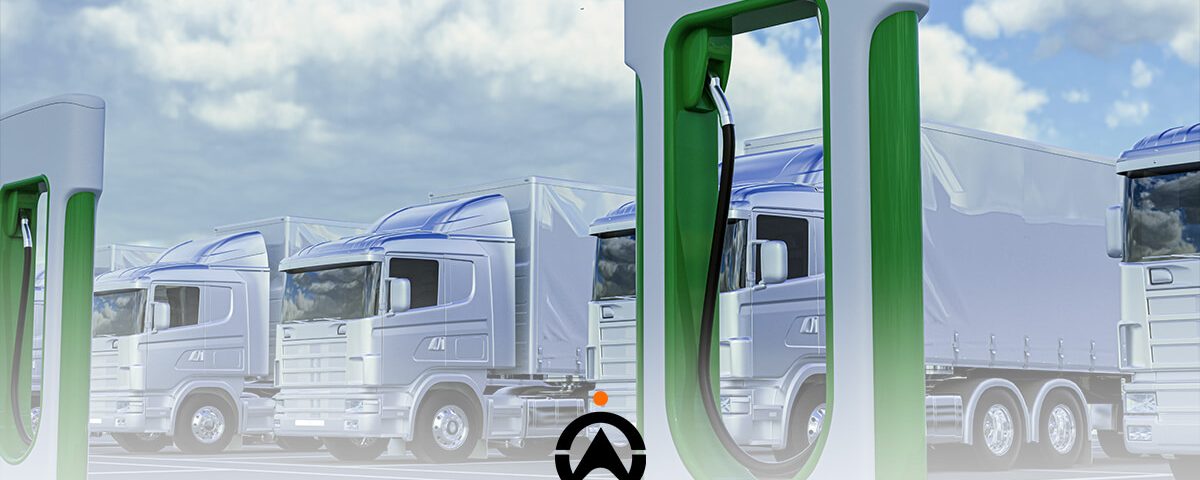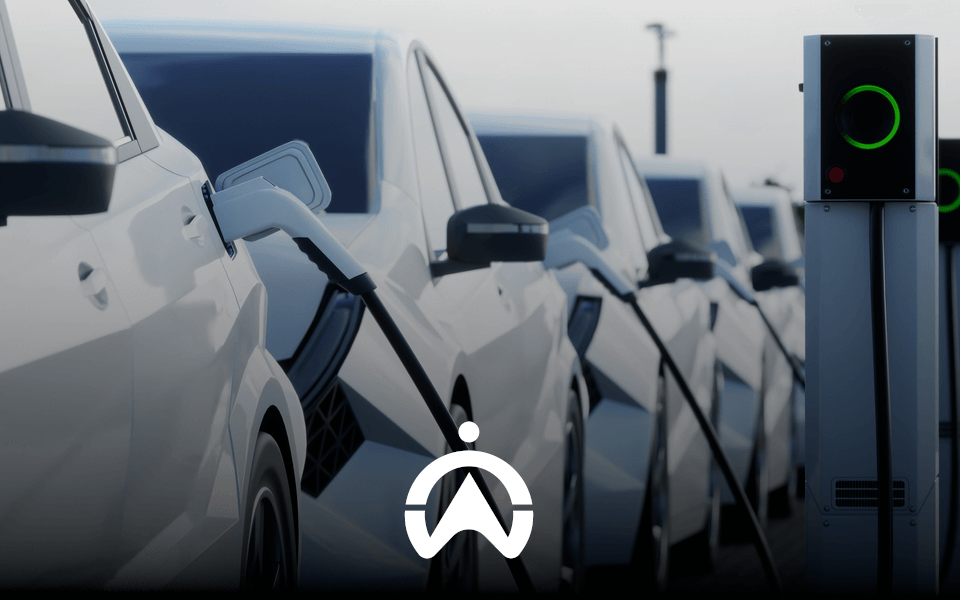What Is Fleet Electrification? And How To Prepare For The Transition
We all know how much the transportation sector impacts our environment with all those emissions. But how many of us are actively doing something about it?
Fleet electrification has presented itself as a possible solution. Should your fleet jump on this eco-friendly train, and how can your business ease into the transition?
Let’s dive in and find out if it’s the right move for you.
What is an electric vehicle?
Electric vehicles, commonly known as EVs, are vehicles designed to operate entirely or partially using electricity as their primary source of power. In contrast to conventional vehicles, which rely on gasoline or fossil fuels, electric vehicles make use of an electric motor that draws energy from advanced sources such as rechargeable batteries or fuel cells. These sources supply the necessary electricity to power the rechargeable battery, enabling the vehicle to move. Electric vehicles are split into two types:
- Battery Electric Vehicles (BEVs): These are powered entirely by electricity that is stored in batteries
- Plug-in Hybrid Electric Vehicles (PHEVs): These feature both an electric motor and a regular petrol or diesel engine.
Electric vehicles are revolutionising the way we move and impacting fleets in businesses, with many companies now opting for fleet electrification.

What is Fleet Electrification?
Fleet electrification refers to a fleet strategically shifting its vehicles from traditional gasoline or diesel-fueled vehicles to zero-emission electric vehicles.
This switch encompasses a variety of vehicle types, including vans, trucks, and cars, all powered by electricity. This shift is driven by a range of factors, including advancements in battery technology, decreasing costs of electric vehicles, and the need to mitigate the effects of climate change.
Fleet electrification not only contributes to environmental sustainability but also aligns with broader efforts to achieve cleaner, more sustainable transport.
How Does Fleet Electrification Benefit Your Business?
The adoption of electric vehicles can be beneficial to fleets in numerous ways. These benefits include:
- Positively impacts the environment: One of the greatest benefits of fleet electrification is the reduction in greenhouse-gas emissions. Given the transportation industry’s significant contribution to these emissions, the integration of electric vehicles into fleets acts as a solution to curbing their environmental impact and combating climate change. EVs produce zero tailpipe emissions, so embracing this approach can help your business reach emission reduction and sustainability goals, subsequently positively enhancing its reputation and image.
- Acts as a sustainable energy source: Fleet electrification acts as a sustainable energy sourceby not only reducing carbon emissions from vehicle exhausts but also by promoting the use of renewable energy sources in the transportation sector. Although electricity in itself is not a sustainable energy source, it can be generated from renewable sources like solar, wind, or hydroelectric power, which further reduces the impact on the environment.
- Decreases fleet fuel costs: Fuel costs are an exceptionally high point of concern for fleets and have been for years. With fleets spending over 20% of their budget on fuel, lowering this can have a positive impact on a business’s fleet. High fuel costs have a significant impact on fleet efficiency, leading to reduced fuel efficiency and increased operating costs.
- Reduces maintenance costs: Fleet electrification can reduce maintenance costs significantly. A 2020 Consumer Reports study indicated that EVs can save owners approximately 50% in maintenance costs compared to a traditional gasoline vehicle. This is partially because EVs require far less maintenance.
There are only three types of fluids that are needed to run EVs: coolant, windshield washer, and brake fluid. Electrical vehicles do not need oil changes, transmission flushes, or other engine fluid replacements, which directly translates to a decrease in the number of times your vehicles undergo maintenance.
The Implementation of Electric Vehicle Fleet Management
Applying fleet management for EVs involves efficiently handling a group of commercial electric vehicles, which can consist of delivery vans or company cars. Fleet managers are responsible for vehicle maintenance, driver monitoring, and route optimisation to name a few. These responsibilities are a challenge for fleet managers with traditional vehicles and can be equally challenging for fleet managers with electric vehicles, making fleet management vital, irrespective of the nature of your fleet.
EV fleet management systems are designed to offer companies the ability to enhance productivity, save costs, and ensure compliance across their entire fleet. Fleet management can help electric vehicle fleet managers in this regard, by giving them access to real-time data on vehicle performance, battery life, costs, and more.

Factors That Can Hinder Electric Vehicle Adoption in a Fleet
Many fleet managers have shied away from adopting an electric fleet for numerous reasons, including:
- The High Initial Price: One unavoidable aspect of fleet electrification is the higher upfront cost in comparison to traditional vehicles. This initial cost can pose a big challenge, especially when strict budget constraints need to be adhered to. However, it is crucial to remember that, over time, the operational cost benefits are undeniable. Electric vehicles can eliminate the reliance on traditional fossil fuels, which leads to substantial fuel cost savings.
- The Availability of Charging Stations: A reliable charging network is crucial for the implementation of an EV fleet. Fleet vehicles need efficient charging stations to function smoothly, as more charging stations translate to reduced downtime. A strong EV fleet charging network and effective EV fleet tracking ensure optimal access to charging points and minimise idle time.
- Range Anxiety: A 2019 Kia Motors study found that 80% of fleet managers were held back from making the switch to electric vehicles due to range anxiety. Range anxiety describes the fear that electric vehicle drivers experience when they are concerned about the distance an EV can travel on a single charge and the possibility of getting stranded during a journey. An example we have of this is the Volvo FH. Volvo’s FH Electric has a maximum range of about 300 kilometres and a gross combined weight rating of 44 tons. While this is impressive for an EV, a diesel FH with the same GCWR can go 1,000 km between fuel stops. This tends to apply to the majority of electric vehicles, making fleet managers concerned about the impact this will have on their fleet efficiency.
- Battery Degradation and Replacement Costs: Electric vehicle batteries can degrade over time, and their capacity to store energy diminishes. This can lead to a reduction in vehicle range and may require battery replacements.
The Role of Telematics In Electric Fleets
Telematics is a technology that makes use of telecommunications and informatics to collect GPS fleet tracking data and a range of other vehicle-specific information. Telematics can provide in-depth data on vehicle speed, braking, and the areas the vehicle travelled to and from. Just like gasoline-powered fleets, telematics plays a significant role in electric fleets by providing crucial data and insights that can optimise the efficiency, performance, and management of electric vehicles. Here are the key roles that telematics plays in electric fleets.
- Monitoring Battery Performance: Telematics gives fleet managers access to battery performance history. This information helps them optimise battery performance, leading to an improvement in overall fleet efficiency.
- Cost Savings and Efficiency: Telematics gives fleet managers insight into energy usage patterns, which enables efficient route planning and maintenance scheduling. This helps improve operational efficiency, reduce energy costs and save costs.

How Cartrack Nigeria Helps You Tackle The Key Challenges of Fleet Electrification
- Reducing range anxiety
The time required to recharge an electric vehicle can significantly impact fleet operations. Quick and convenient charging solutions are needed to minimise downtime, especially for commercial use. This makes planning your routes important, as a higher density and accessibility of charging stations along a driver’s route not only enhances the convenience of charging a vehicle but also alleviates the concern of range anxiety among drivers and fleet managers.
Cartrack’s advanced system allows you to easily locate charging stations along drivers’ routes, plan recharge times, and monitor each EV’s battery level in real-time. This helps you maintain optimum battery life, minimise surprise downtime, avoid costly breakdowns, and ensure that you’re always aware of your EV’s range status.
- Promoting preventative vehicle maintenance
Adhering to a comprehensive maintenance routine is important for reducing fleet operational costs. For instance, ensuring your electric vehicles maintain optimal tire pressure is important for maximising vehicle mileage per charge.
Since electric vehicles don’t require the same maintenance that gasoline-powered vehicles typically do (such as oil changes and spark plug replacements), maintenance will mainly include:
– Brake inspections
– Tyre rotation
– Battery healthUse Cartrack’s preventative maintenance to gain access to predictive analytics. This predictive analytics feature facilitates the scheduling of timely maintenance and offers insights into optimal timing for battery replacements. EV battery replacements can be quite costly, so making use of a good preventative maintenance system is important to prolong battery life. The average EV battery life span is estimated to last between 10-20 years, but poor vehicle health can shorten this lifespan.
Easily Convert Your Fleet to an Electric One with Cartrack Nigeria
The future is electric, with industry experts predicting that electric vehicles will account for 40% of car sales by 2030 and 57% of all cars on the road by 2040.
Learn how Cartrack Nigeria can ease you into this transition and help you efficiently manage your EV fleet.
Contact Cartrack Nigeria today, and let’s make the process as seamless as possible.




